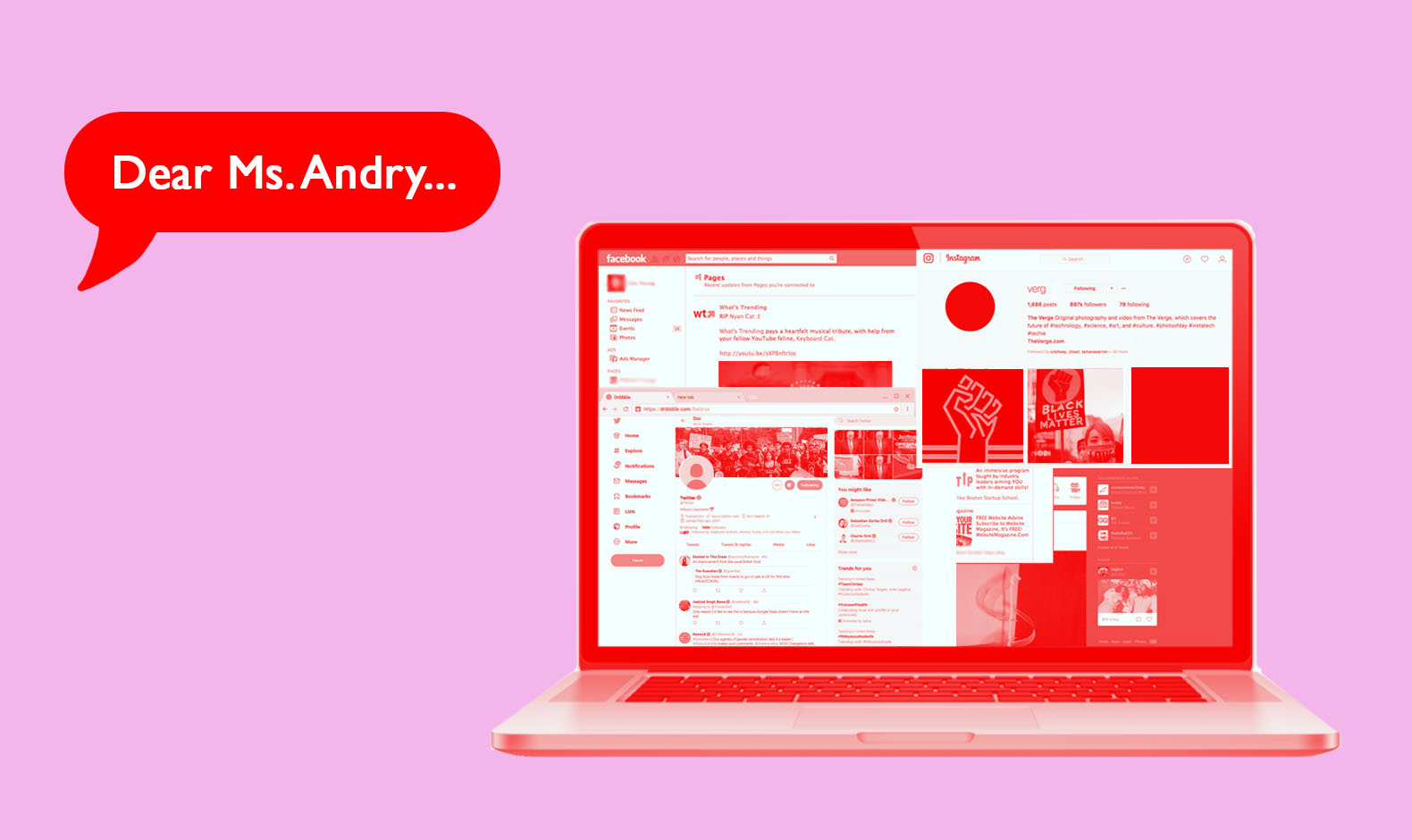Dear Ms. Andry: Allyship and Mental Health

Image description: A red laptop with Instagram, Tumblr, Twitter, and Facebook tabs open over a pink background.
Question:
Dear Ms. Andry,
Lately, I’ve been seeing increasing activism on social media and I’m trying to learn from it and be a good ally/stay well informed, but it does take a toll on my mental health. That being said, I don’t want to take time away from social media and stay uninformed. How do I handle this situation?
Sincerely,
Apprehensive Ally
Answer:
Dear Apprehensive Ally,
First of all, it’s great that you are trying to keep yourself informed and want to be as engaged as you can! The methodology and efficacy of online activism can certainly be critiqued, but social media has effectively encouraged more people to self-educate, which often leads to engagement in activism.
The toll that both awareness of injustice and engagement in activism takes on your mental health is valid. Constant exposure to negative news and increasing awareness of the United States’ ingrained systems of oppression can make it feel as though we are living in a hopeless cycle. It’s also important to keep in mind that the fatigue we may feel as allies pales in comparison to the pain experienced by those with whom we are allied. Being constantly reminded of the oppression of a group of people is certainly disheartening, but it is nowhere near as harrowing as experiencing that oppression yourself.
That said, how do we deal with the fatigue that comes with doing this necessary and important work? More importantly, how can we give ourselves space to remain optimistic and functional while still keeping informed and engaged?
The most important thing is to remember that the oppression and injustice that is receiving more media attention of late is not new. That is not at all to say that it is excused or cannot be remedied. However, keep in mind that just because you are becoming more aware of these things now does not mean they popped up overnight, nor are they situational. Thus, these systems are not going to be dismantled overnight either. We cannot dive wholeheartedly into intense activism assuming that it will be “fixed” in a few years if we work as hard as we can; it’s important to cultivate activist practices that are sustainable. We are in it for the long haul. It is far more beneficial to commit to long-term engagement than to burn out after a few months of hourly link reposting and thinkpiece reading.
Meaningful activism, too, almost always begins (or takes place) at the community level. Online petitions proclaiming to direct themselves at the president or the Speaker of the House are alluring, but rarely are these petitions sufficient to achieve substantive change. Not only can these approaches exacerbate your frustration by making it seem as though activist work is akin to yelling at a brick wall, but they also start from the wrong end. By actively engaging within your community (see below for a few examples of how to do this), you can offer tangible help in the form of physical or intellectual labor that directly impacts those around you. In addition to signing a Change.org petition directed at Joe Biden himself asking to end homelessness once and for all, you could:
- Volunteer at or donate food to a food bank, food pantry, or community fridge that provides free or reduced-price groceries and meals to those experiencing homelessness
- Donate money, time, and/or labor directly to friends, family, and peers experiencing homelessness (e.g., providing transportation, cooking meals, opening your home or apartment for temporary shelter)
- Here is one example of how social media can help you engage in direct action: The Venmo, Cashapp, and Paypal usernames of (in this example) queer youth experiencing homelessness are easy to find, especially with the uptick in influencers spreading these fundraising efforts.
- Donate money to a local homeless shelter or organization providing housing, food, and/or clothing to queer youth of color experiencing homelessness
These may feel less “big” than putting your name on a petition to the President, but this kind of direct action and community support creates tangible, immediate change for individuals and families experiencing (again, in this example) homelessness. Even if — and it’s a big “if” — that petition reached Joe Biden’s desk, there is no way that he could eradicate homelessness without the kinds of community aid listed above. A signature will not put a roof over anyone’s head.
While it can make you feel like you aren’t doing enough, following other activists who are making substantive change through community work and engagement can also be worthwhile. It serves as a motivation for when issues seem irremediable. Even more importantly, effective activists often share ways that you can get involved without having to spearhead an entire movement yourself. There’s a misconception, especially in the age of social media “slacktivism” and its critiques, that one only has two options: complacency (and thus complicity) or full-time activism. By engaging with established movements, organizations, and groups, you can help contribute to change in a way that seems less overwhelming and makes use of the exact structures that these activists have spent time and resources to build.
Lastly, though it may seem trite, take care of yourself. Simply feeling guilty for having time, resources, opportunities, and privileges that others don’t have will not solve anyone’s problems and will only create a cycle of guilt-derived inaction. Interrogation of inequalities and injustices is important, but activism and self-care are not mutually exclusive. It is okay to feed yourself even as you know that others are going hungry — be grateful that you are fortunate enough to have reliable meals, take advantage of that, and then work to afford it to others. While it is important to give from what you have, you must begin by giving to yourself.
Sincerely,
Ms. Andry




